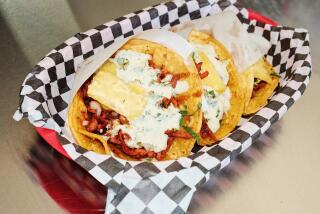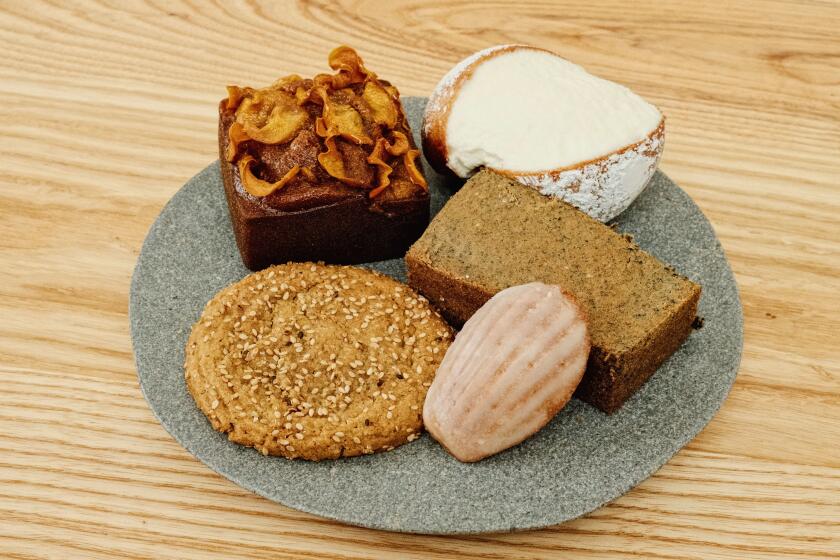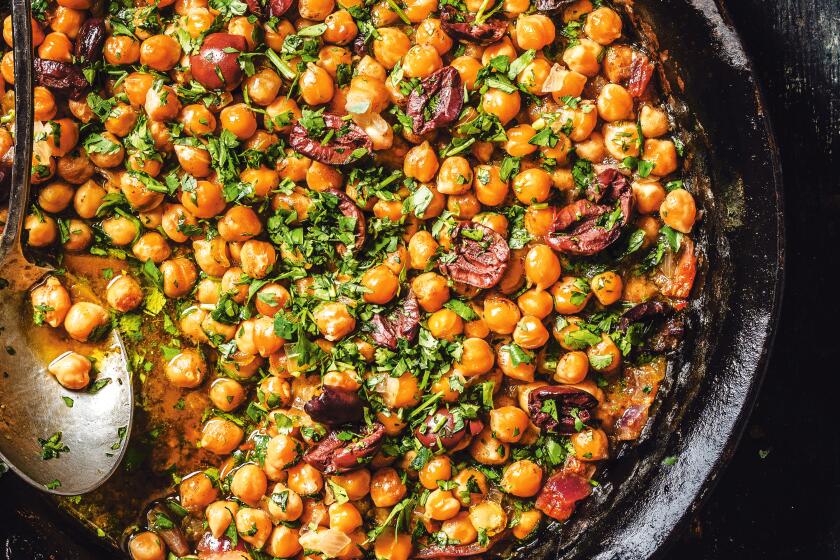How chicken sausage links became a centerpiece to South L.A.’s black food culture
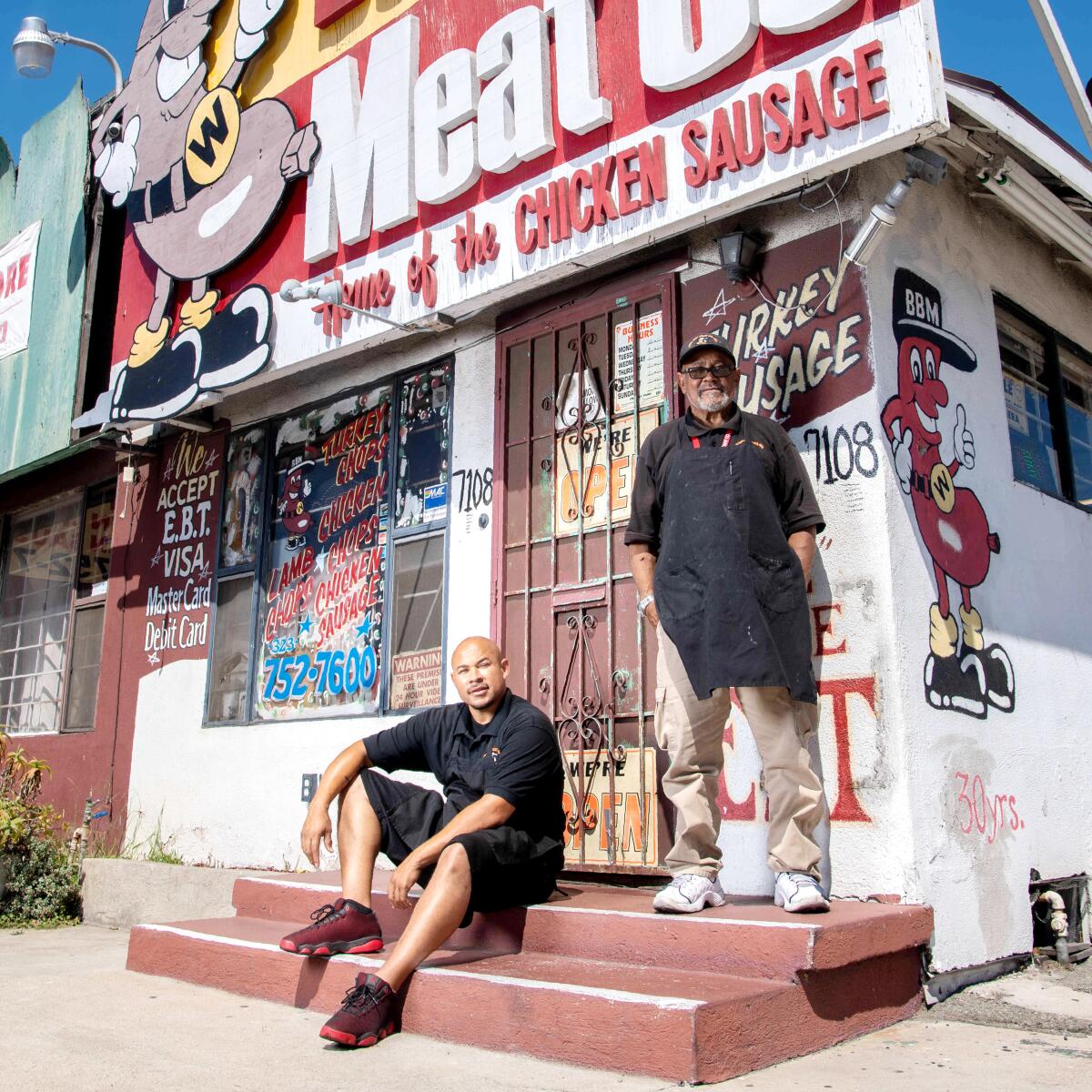
Shortly after the griddle is flipped on at Mama’s Chicken in Hyde Park, the day’s parade of customers starts to trickle in. Pickup orders are called out from a worn formica counter in back: biscuit sandwiches, hot cakes, wings, cheeseburgers, tacos, red beans and rice.
But no self-respecting regular strolls out of Mama’s with just breakfast (or lunch) in hand. An esteemed institution in South Los Angeles, the 55-year-old market’s claim to fame, and perpetual bestseller, is its chicken sausage links, sold in 2- and 5-pound boxes, each emblazoned with the bold claim: “The Best in the World.” On holiday weekends, when the store might go through a few hundred pounds of sausage a day, lines can stretch into the parking lot.
For the record:
6:09 p.m. Aug. 27, 2019An earlier version of this article listed Best Buy Meat of Hyde Park as Best Buy Meats.
“The sausage was the thing that put us on the map,” says Karen “Mama” Whitman, 64, the market’s longtime owner and proprietor.
Mama’s Chicken might be the city’s best-known chicken sausage purveyor, but it’s far from the only one. For decades, a small but tenacious group of black-owned businesses have proudly supplied South L.A. with spicy, snappy, poultry-based links, a centerpiece to countless backyard barbecues and a mainstay at multitudes of neighborhood restaurants and diners.
The sausage was the thing that put us on the map.
— Karen “Mama” Whitman, owner of Mama’s Chicken
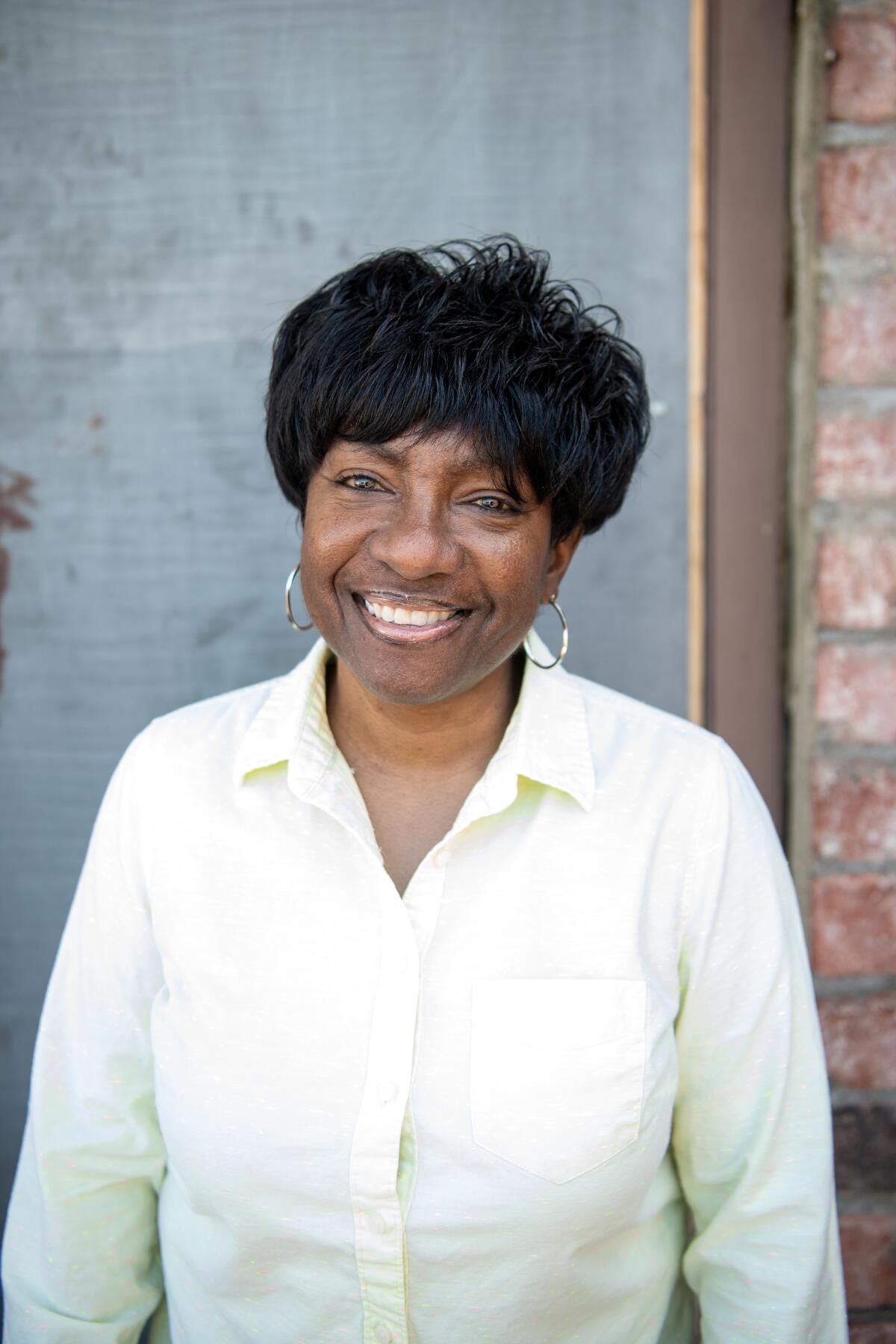
Wafts of hickory smoke coming from Phillips Bar-B-Que perfume several blocks of Crenshaw Boulevard, where chicken links come smothered in a thick, molasses-kissed sauce. At Stevie’s Creole Cafe in Mid-City, chicken hot links come tucked inside a po’ boy, split and seared and dressed with lettuce, tomatoes, pickles, tomatoes and a lush smear of Blue Plate mayonnaise. There’s chicken sausage with eggs and waffles on the menu at Roscoe’s, chicken sausage with hash browns at Watts Coffee House, and chicken sausage with grits at Inglewood’s Serving Spoon. M & M Soul Food in Carson gilds its heaping hot link dinners with sides of cornbread, collard greens and candied yams.
Unsung as it may be, chicken sausage plays an indispensable role in the city’s African American food culture, quietly popping up in soul food, barbecue and Cajun-Creole cuisine. Among a generation of black Angelenos, chicken sausage isn’t just a mild-mannered substitute for pork, it’s a nostalgic comfort food that smacks distinctly of home.
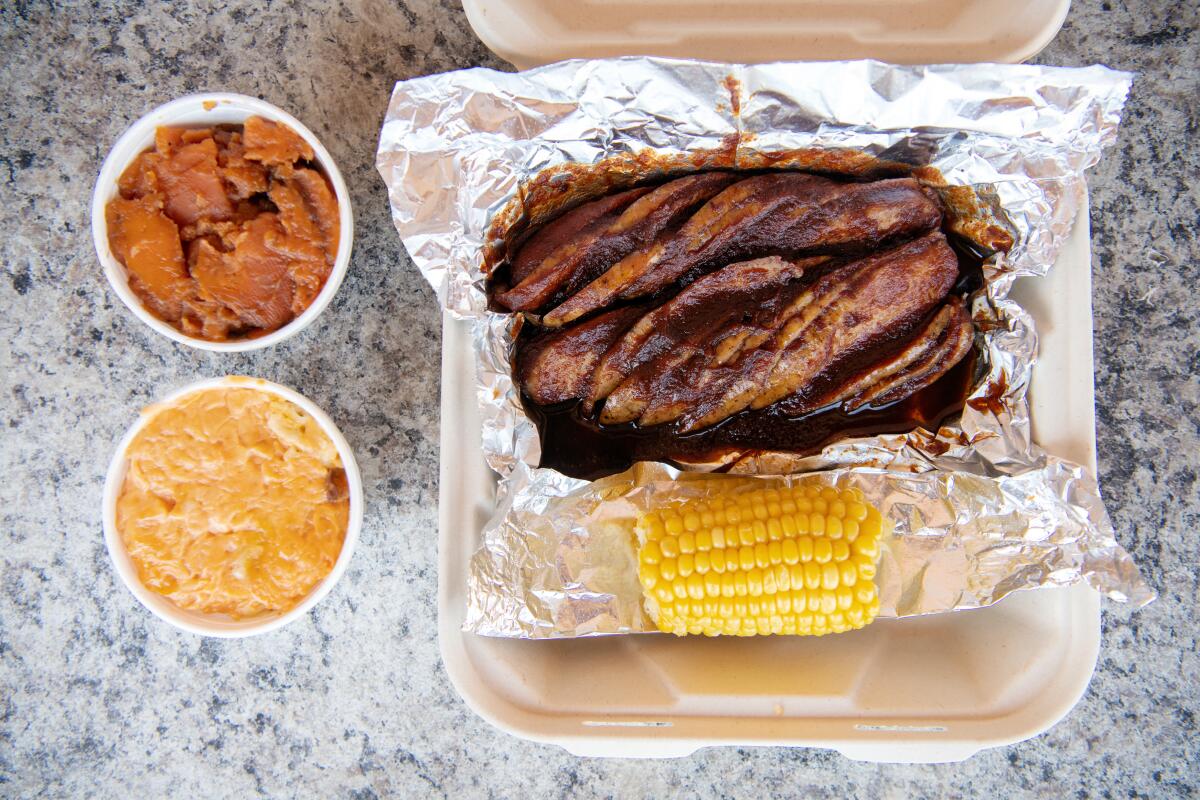
“The relationship that Los Angeles has with chicken sausage is very interesting, because in most other cities what you find is turkey,” says Adrian Miller, the author of “Soul Food: The Surprising Story of an American Cuisine, One Plate at A Time.” In his forthcoming book on barbecue culture, Miller is devoting a chapter to the rise of what he calls “pork alternatives,” a shift toward lower-fat, lower-cholesterol proteins like chicken and turkey in barbecue and soul food kitchens and a trend in which L.A. has had an outsize role.
First, some history
As with many cities outside the American South, the three-decade-long Second Great Migration, which began in the 1940s, had a transformative effect on L.A. Attracted by jobs in the booming aerospace and defense industries, hundreds of thousands of black Southerners took part in a grand migration toward Los Angeles; a majority hailed from the South’s western fringe, in particular East Texas, Arkansas and Louisiana.
One such transplant was George White, born in the town of Benton, La., in 1927. At 16, White boarded a Southern Pacific train bound for L.A. After years of working as a pipe threader and welder (and later selling insurance alongside Shreveport expat Johnnie Cochran Sr.), White opened Miracle Market along Compton’s main drag in 1961. As one of the city’s few full-service groceries, it quickly became a destination for traditionally Southern ingredients — sweet cane syrup, black-eyed peas and Louisiana hot links.
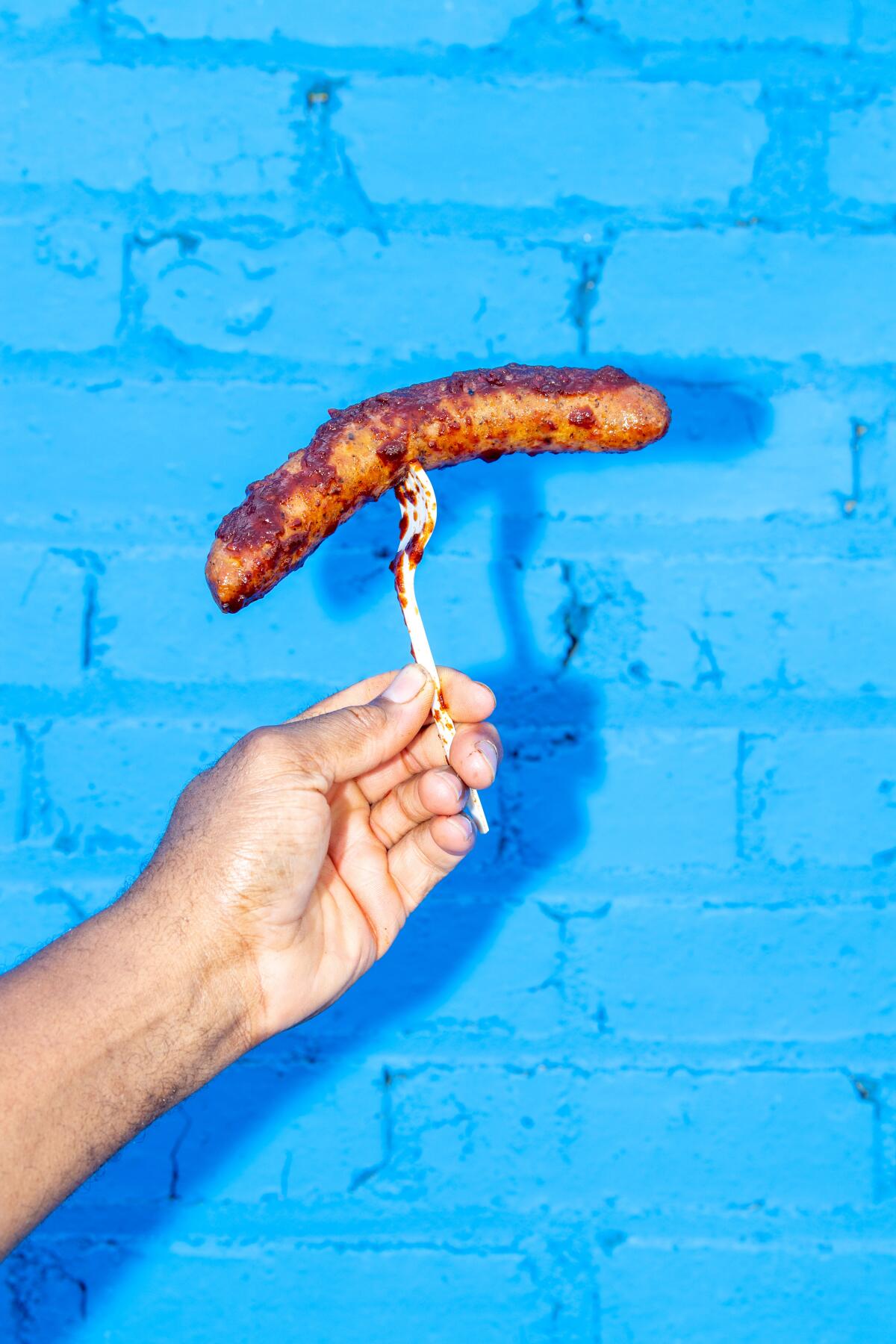
Turner’s Market & Poultry, a Southern-style butcher shop founded by Louisiana native George Turner in 1953, sits a few miles north in Watts. Billed in a 1988 Los Angeles Times article as “a Watts institution,” the store’s wide glass butcher case brimmed back then: smoked turkey tails, pig’s feet, slabs of spicy head cheese. Most prominent were freshly ground hot links stacked into glistening pyramids; in later years, customers who had departed Watts for wealthier suburbs still made regular pilgrimages.
Yet if there’s one operation that neatly outlines the hot link’s local history, it’s the family-run Pete’s Louisiana Foods, housed in a squat cinder block building along Jefferson Boulevard. Founder Leon Oliver, a German-Creole who moved to L.A. in the 1940s, began selling spicy andouille-esque sausages seasoned with garlic and cayenne around 1949; back then, a majority of Oliver’s customers belonged to an expat Cajun-Creole community that had sprung up in Jefferson Park. A bar and pool hall there would later become Harold & Belle’s, a destination for étouffée and fried catfish that remains the city’s oldest operating Creole restaurant.
“Our family has used Pete’s since before I was born, before the restaurant was even open, I believe,” says third-generation owner Ryan Legaux. Sliced into the bubbling vats of gumbo and jambalaya, the peppery links have long been a headliner among the restaurant’s time-capsule repertoire.
We’ve had people come from Louisiana to buy our sausage because they couldn’t get chicken ones back there.
— Chris McCord, owner of Urseila’s Meats
“We used them because, first, [Oliver] was family and, second, they were the best in town,” recalls Denise Legaux, daughter of founder Harold Legaux. The restaurant uses only beef links, however, not the chicken links that Pete’s introduced in the late 1980s, a purist’s choice that Denise Legaux insists upon. “I’ve never been a fan of the chicken one,” she says. “But plenty of people ask about it.”
Similar to the fiery pork-based links endemic to Chicago’s South Side, L.A. links tend to draw from two lineages: Louisiana and East Texas. Louisiana-style links are often spiced with cayenne, paprika, cumin and thyme; the Texas variety favors dried sage, black pepper and red pepper flakes. Yet distinctions aren’t hard and fast. Most shops tend to offer a range of flavors: mild, garlic, no pepper, extra hot, extra extra hot. Sausages can be sold as links — stuffed into natural casings and tied — or sold loose as ground meat. (“All links are sausages but not all sausages are links,” one butcher put it to me.)
The link to chicken is made
By most accounts, chicken sausage appeared in South L.A. during the early ’80s, arguably around the same time future sausage kingpin Bruce Aidells was hawking Provençal-inspired chicken-apple sausages door-to-door in Berkeley. The origin story traces back to Holmes Homemade Chicken Sausage, a strip mall storefront in Compton decorated with two oversize fish tanks and a colorful photo collage dedicated to family patriarchs Darryl and Pia Holmes (“You’ve Never Had Chicken Like This,” a sign outside reads).
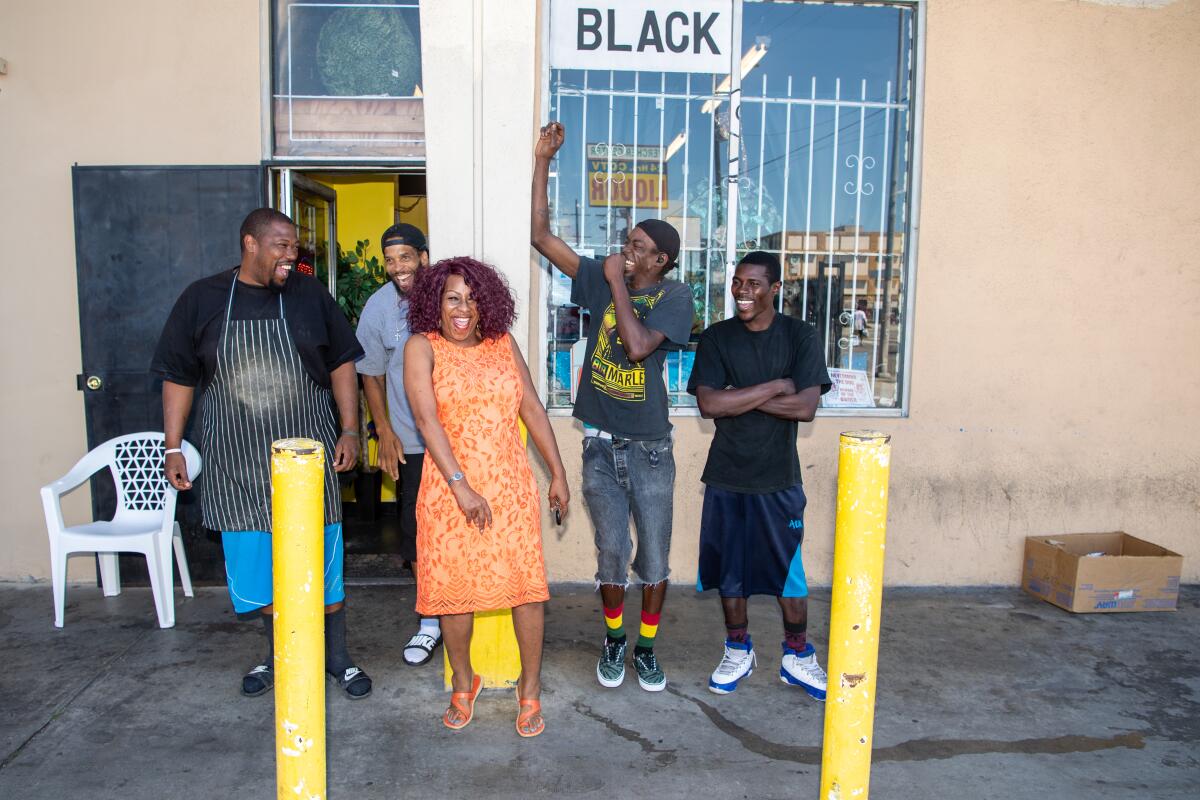
According to Darryl Holmes’ goddaughter Jennifer Sanderson, sometime around 1980 there were two neighboring families, the Holmeses and the Hookses, who sold sausage out of their Crenshaw homes. Darryl Holmes was originally from Texas. He served in the Army before moving to L.A. and while stationed in Germany met his wife, Pia. Holmes’ sausage fell somewhere between bratwurst and what’s often labeled “country sausage,” heavy with sage and red pepper but also dashed with hints of ginger, nutmeg and cardamom, a dual reflection perhaps of Darryl’s Texas roots and Pia’s Bavarian heritage.
At some point the front-porch operation become so popular that city officials noticed and shut it down. The families split. The Holmeses relocated to Compton and launched their own business before eventually retiring to Phoenix. Darryl Holmes passed away three years ago; his daughter Shanita Holmes still owns the company, Sanderson runs the shop most days. Business remains brisk. LAFD and maintenance workers from LAX order sausages in bulk a few times a year for company breakfasts and barbecues; Robert Earl’s BBQ in Long Beach and the Rib Nest in Gardena are customers.
As for the Hookses? Thirty years ago a man who had worked for Mr. Hooks strolled into Mama’s Chicken and offered to prepare sausages for the market to sell. “We were mostly known for fried chicken back then, but I hired him and he ended up making our sausage for the next 24 years,” recalls Karen Whitman.
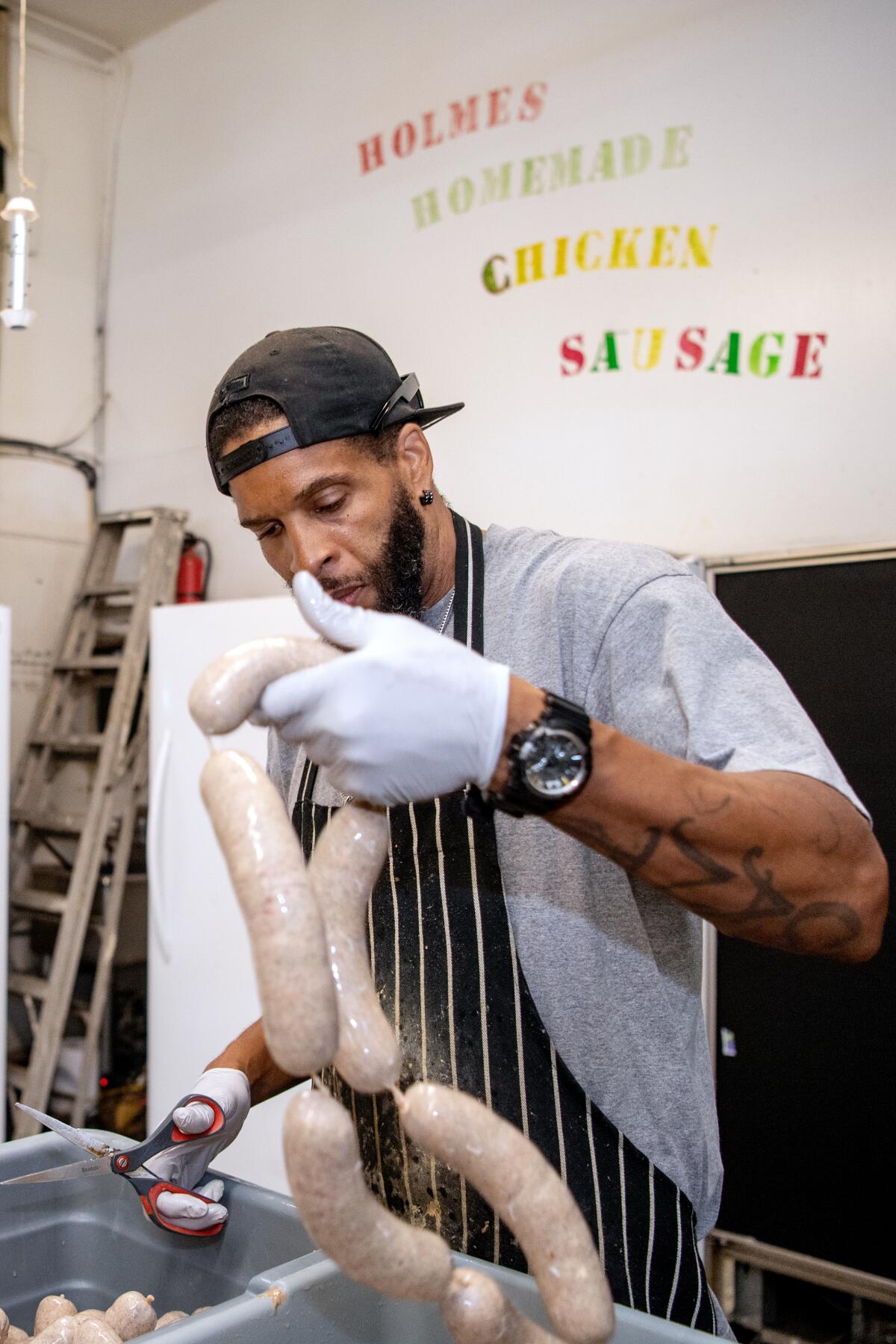
Whitman says the store dabbled with turkey, beef and pork links initially, but chicken emerged as a clear winner. “At that time beef had a bad rap, so folks gravitated toward chicken,” she says. “That’s really how it became popular, because you were eating something that tasted great and was better for you. We just happened to be there at the right time.”
Why has the bird remained on top? Several owners spoke to a loyalty toward chicken sausage’s particular texture and flavor. “Throw them on the grill and, boom, they plump up like crazy,” says Chris McCord, owner-operator of Urseila’s Meats near Westmont and the sausage supplier for Roscoe’s Chicken & Waffles. “We’ve had people come from Louisiana to buy our sausage because they couldn’t get chicken ones back there.”
Walter Hart Sr. and Jr., the father-son duo behind Best Buy Meat in Hyde Park, found that customers returned for cuts they couldn’t find in the supermarket, whether it was their bestselling chicken sausage or thick turkey chops that stayed tender in the frying pan.
“It’s actually easier to make sausages with chicken because the thighs have the ideal amount of fat you need,” says Walter Hart Jr. “They tend to stay juicier and they take well to seasonings.”
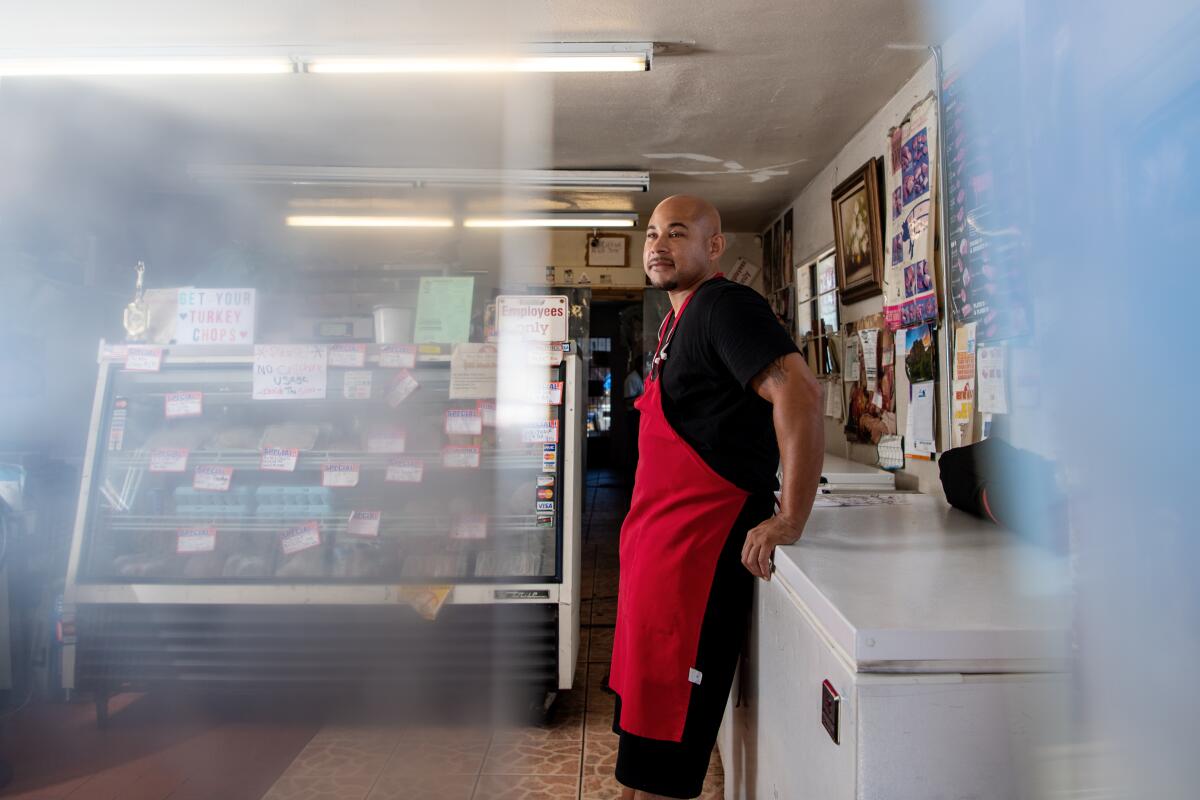
But while chicken hot links have remained as marketable as ever — Farmer John’s released its own brand several years back — the community that championed them has gradually dwindled. According to census data, African Americans now make up less than 9% of the city’s population, down from 17% in the 1980s. For some South L.A. businesses, that decline, as well as an overall lack of civic investment, has led to tough realities.
Money Saver Meats, entrepreneur Ozabe Banks’ storefront in Hyde Park (“Home of the Best Chicken Sausage”), closed in 2017 after nearly 30 years in business. That same year, Beverly Shields sold Harris Grocery Market in Watts, a neighborhood establishment opened by her late father in 1968. Shields, now in her 60s, still returns to the store each week to grind the sausages her Texan father made famous, though these days they share fridge space with Zacatecas-style chorizo prepared by new owner Manuela Zambrano.
In 1988, 74-year-old George Turner made plans to retire to Palmdale and sell Turner’s Market & Poultry to two young and ambitious black professionals: real estate broker Baron Jones and his lawyer, Basil Clark. The transfer of ownership was enough to warrant a visit from Mayor Tom Bradley as well as an enthusiastic feature in the Los Angeles Times. Any optimism was short-lived: Basil Clark was disbarred for mishandling funds and later sent to prison. Turner lived to age 105; his eponymous market was sold in the late ’90s to its current owner, Chung Kim, who still prepares the hot links in-house.
Hope for a new generation of tube stuffers, however, might lie with Michael “Shad” Lawless, the 33-year-old chef behind Shad’s New Cali, a catering outfit that launched on Instagram in 2013 and expanded into a food truck back in March. Lawless grew up a couple blocks from Miracle Market in Compton; like George White, his family were Louisiana transplants. “My grandfather loves a good hot link,” he says. “That and a slice of white bread and he’s happy.”
Where to buy chicken sausage in South L.A.
When three of Lawless’ friends and fellow Instagram chefs — Calvin Johnson of Bleu Kitchen, Jermelle Henderson of Taco Mell and Keith Garrett of All Flavor No Grease — opened Ladera Heights’ Court Cafe in July, Lawless created a from-scratch chicken sausage meant for the cafe’s signature breakfast sandwich. The recipe was a hit, but plans to put it on the menu were shelved while Lawless focused on his food truck. Eventually the restaurant decided to source its sausage from — where else? — Mama’s Chicken.
Lawless hopes to launch his own sausage company, provided he can find the right manufacturer. But that’s all on the horizon; right now he’ll readily acknowledge who rules the roost. “Mama’s is the one you get compared to — everyone loves it,” he says. “If I can produce something on par with that, it’s a good place to start.”
More to Read
Eat your way across L.A.
Get our weekly Tasting Notes newsletter for reviews, news and more.
You may occasionally receive promotional content from the Los Angeles Times.


